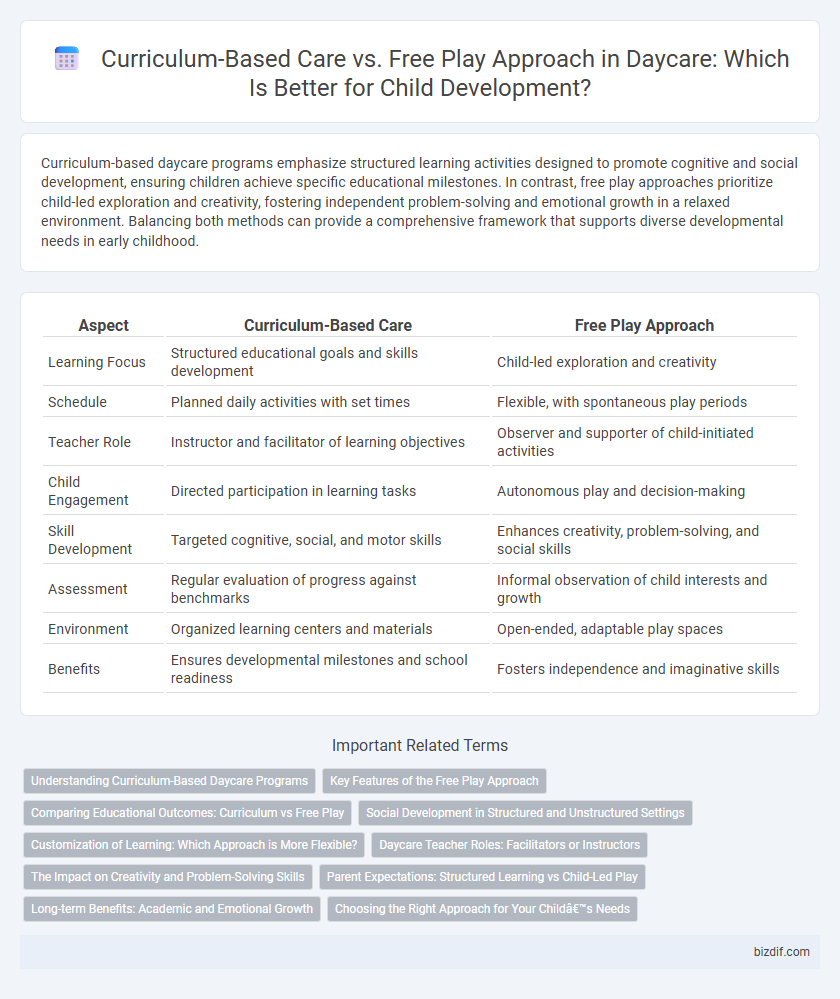Curriculum-based daycare programs emphasize structured learning activities designed to promote cognitive and social development, ensuring children achieve specific educational milestones. In contrast, free play approaches prioritize child-led exploration and creativity, fostering independent problem-solving and emotional growth in a relaxed environment. Balancing both methods can provide a comprehensive framework that supports diverse developmental needs in early childhood.
Table of Comparison
| Aspect | Curriculum-Based Care | Free Play Approach |
|---|---|---|
| Learning Focus | Structured educational goals and skills development | Child-led exploration and creativity |
| Schedule | Planned daily activities with set times | Flexible, with spontaneous play periods |
| Teacher Role | Instructor and facilitator of learning objectives | Observer and supporter of child-initiated activities |
| Child Engagement | Directed participation in learning tasks | Autonomous play and decision-making |
| Skill Development | Targeted cognitive, social, and motor skills | Enhances creativity, problem-solving, and social skills |
| Assessment | Regular evaluation of progress against benchmarks | Informal observation of child interests and growth |
| Environment | Organized learning centers and materials | Open-ended, adaptable play spaces |
| Benefits | Ensures developmental milestones and school readiness | Fosters independence and imaginative skills |
Understanding Curriculum-Based Daycare Programs
Curriculum-based daycare programs integrate structured learning activities aligned with educational standards to support cognitive and social development in early childhood. These programs emphasize skill-building through planned lessons in literacy, mathematics, and science, fostering consistent developmental progress. Understanding how curriculum-based approaches contrast with free play highlights the intentional design aimed at maximizing developmental outcomes and school readiness.
Key Features of the Free Play Approach
The free play approach in daycare emphasizes child-led activities that foster creativity, social interaction, and problem-solving skills through unstructured exploration. It prioritizes spontaneous, imaginative play without rigid schedules, allowing children to develop autonomy and emotional regulation naturally. Key features include open-ended materials, flexible environments, and adult facilitation that supports rather than directs learning experiences.
Comparing Educational Outcomes: Curriculum vs Free Play
Curriculum-based care in daycare settings emphasizes structured learning objectives aligned with developmental milestones, often resulting in measurable gains in literacy, numeracy, and social skills. In contrast, the free play approach prioritizes child-led activities that foster creativity, problem-solving, and emotional regulation, with research indicating improved behavioral flexibility and intrinsic motivation. Comparative studies reveal that balanced integration of curriculum and free play maximizes educational outcomes by supporting both cognitive development and socio-emotional growth.
Social Development in Structured and Unstructured Settings
Curriculum-based care in daycare settings emphasizes guided activities that foster social development through structured interactions, promoting skills like cooperation and communication. The free play approach encourages unstructured social engagement, allowing children to develop conflict resolution and creativity organically. Both methods contribute uniquely to social growth by balancing adult-led guidance with child-initiated interactions.
Customization of Learning: Which Approach is More Flexible?
Curriculum-based care offers structured learning tailored to developmental milestones, ensuring consistent educational objectives, while the free play approach promotes adaptability by allowing children to explore interests spontaneously. Customization in curriculum-based care hinges on intentional lesson planning, whereas free play provides flexibility through child-led experiences that adapt to individual creativity and pace. Evaluating flexibility depends on prioritizing either predetermined educational goals or dynamic, interest-driven learning environments.
Daycare Teacher Roles: Facilitators or Instructors
Daycare teachers serving as facilitators in a free play approach support children's exploration and creativity by guiding rather than directing activities, fostering autonomy and problem-solving skills. In contrast, instructors in curriculum-based care deliver structured lessons aligned with developmental goals, emphasizing specific knowledge acquisition and skill mastery. Balancing these roles enhances children's holistic growth by integrating guided learning with opportunities for independent discovery.
The Impact on Creativity and Problem-Solving Skills
Curriculum-based daycare programs structure activities to target specific learning goals, enhancing children's ability to solve problems through guided tasks and intentional challenges. Free play in daycare fosters creativity by allowing children to explore ideas independently and experiment with diverse materials without predetermined outcomes. Combining both approaches supports a balanced development of creative thinking and problem-solving skills in early childhood.
Parent Expectations: Structured Learning vs Child-Led Play
Parents seeking curriculum-based daycare often prioritize structured learning environments that promote early literacy, numeracy, and social skills development through planned activities aligned with educational standards. Those favoring the free play approach expect caregivers to facilitate child-led exploration, fostering creativity, problem-solving, and emotional growth with minimal adult direction. Balancing parent expectations involves clear communication about how each approach supports developmental milestones and the child's overall well-being.
Long-term Benefits: Academic and Emotional Growth
Curriculum-based care in daycare supports long-term academic growth by providing structured learning activities that enhance cognitive skills and knowledge retention. The free play approach fosters emotional development by encouraging creativity, social interaction, and self-regulation, which are critical for emotional resilience. Combining both methods offers a balanced environment that promotes comprehensive academic achievement and emotional well-being in children.
Choosing the Right Approach for Your Child’s Needs
Curriculum-based care offers structured learning activities designed to promote cognitive, social, and emotional development according to specific educational standards, which benefits children needing clear guidance and routine. The free play approach encourages creativity, independence, and social skills by allowing children to explore and learn at their own pace, ideal for fostering imagination and self-motivation. Evaluating your child's temperament, developmental stage, and learning preferences is essential to choosing the right daycare approach that supports their unique growth and well-being.
Curriculum-based care vs Free play approach Infographic

 bizdif.com
bizdif.com